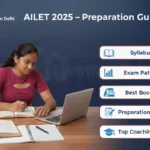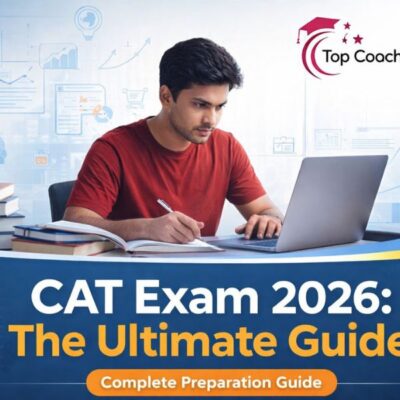The Union Public Service Commission (UPSC) exam, also known as the IAS exam, is one of the toughest and most prestigious competitive exams in India. Every year, lakhs of students dream of becoming an IAS officer, IPS officer, or IFS officer, but only a few succeed.
Delhi has become the hub for UPSC coaching because it offers the best teachers, updated study materials, and a strong community of serious aspirants. From Mukherjee Nagar to Rajinder Nagar, thousands of students come here every year to prepare for the Civil Services Examination (CSE).
For beginners, the UPSC journey can feel confusing — Where to start? Which books to read? Should I join coaching or prepare at home? This blog will guide you step by step, whether you are a new aspirant starting from zero or an experienced aspirant looking for advanced strategies.
In this blog, you will find:
- UPSC exam pattern and syllabus explained in simple words.
- Preparation strategies for beginners and advanced aspirants.
- Best books and study materials recommended by toppers.
- Importance of current affairs for UPSC.
- Role of Delhi coaching institutes in UPSC success.
- Smart tips to balance self-study and coaching.
👉 If you are searching for the Best UPSC Coaching in Delhi, or want to know how to prepare for UPSC at home, this detailed guide will give you all the answers.
Also, with Top Coaching in Delhi (TCD), you can easily compare top IAS coaching centers in Delhi and find the one that matches your needs. Check here: Find Best UPSC Coaching in Delhi.
📝 Why UPSC is India’s Toughest Exam?
The UPSC Civil Services Examination (CSE) is often called the mother of all exams in India. It is not just tough because of the vast syllabus, but also because of the competition and unpredictability.
1. Huge Number of Aspirants
Every year, more than 10–12 lakh students apply for UPSC, but only around 700–1000 candidates get selected for top services like IAS, IPS, IFS, IRS. This makes the success rate less than 0.2%, which is lower than many global competitive exams.

2. Vast and Dynamic Syllabus
The UPSC syllabus covers everything — from History, Geography, Polity, Economy, Science & Technology, Environment to Current Affairs. The challenge is not only what to study but also what not to study.
👉 You can see a detailed syllabus breakdown here: UPSC Syllabus Explained.
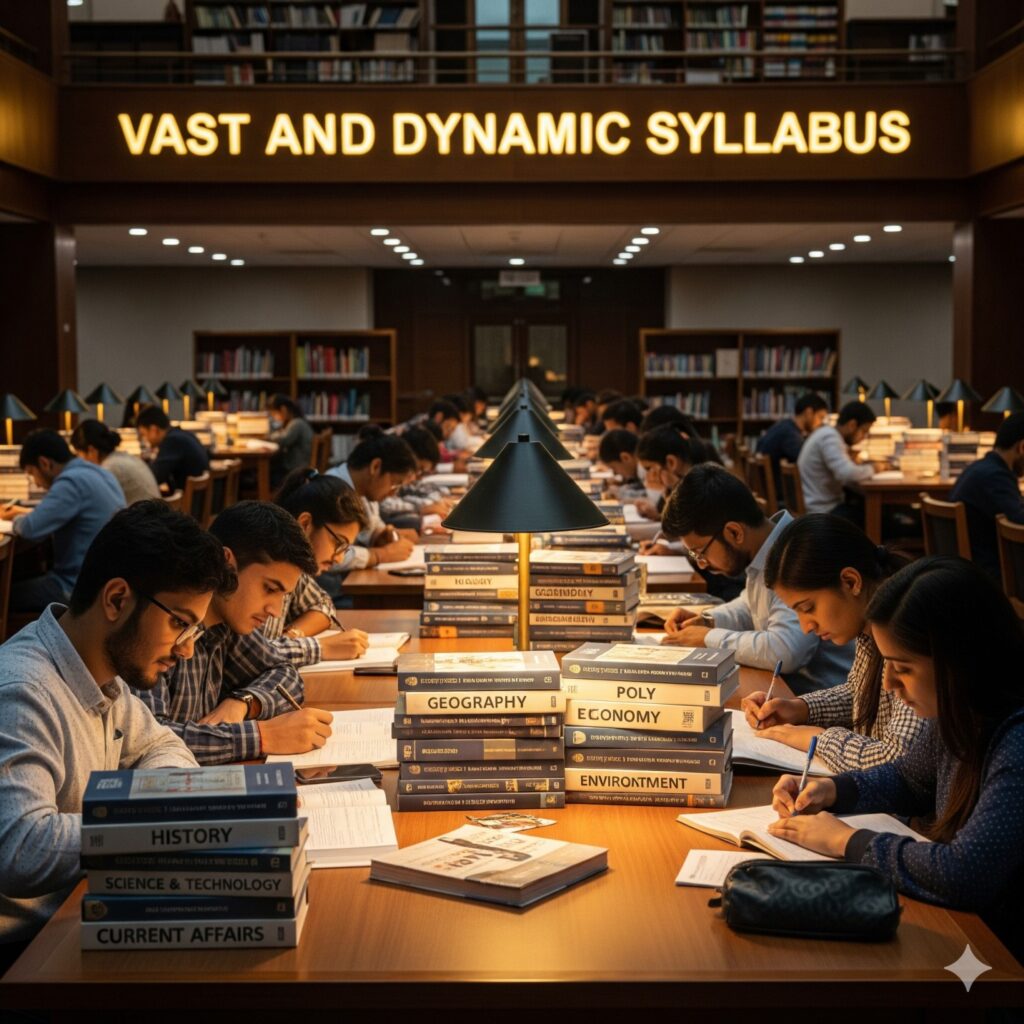
3. Multi-Stage Exam Process
UPSC is not a one-day exam. It has three stages:
- Prelims (Objective Test) – Tests knowledge and accuracy.
- Mains (Descriptive Papers) – Tests analytical thinking and writing skills.
- Interview (Personality Test) – Tests confidence, clarity, and decision-making.
👉 For a complete guide, check: UPSC Exam Pattern in Detail.
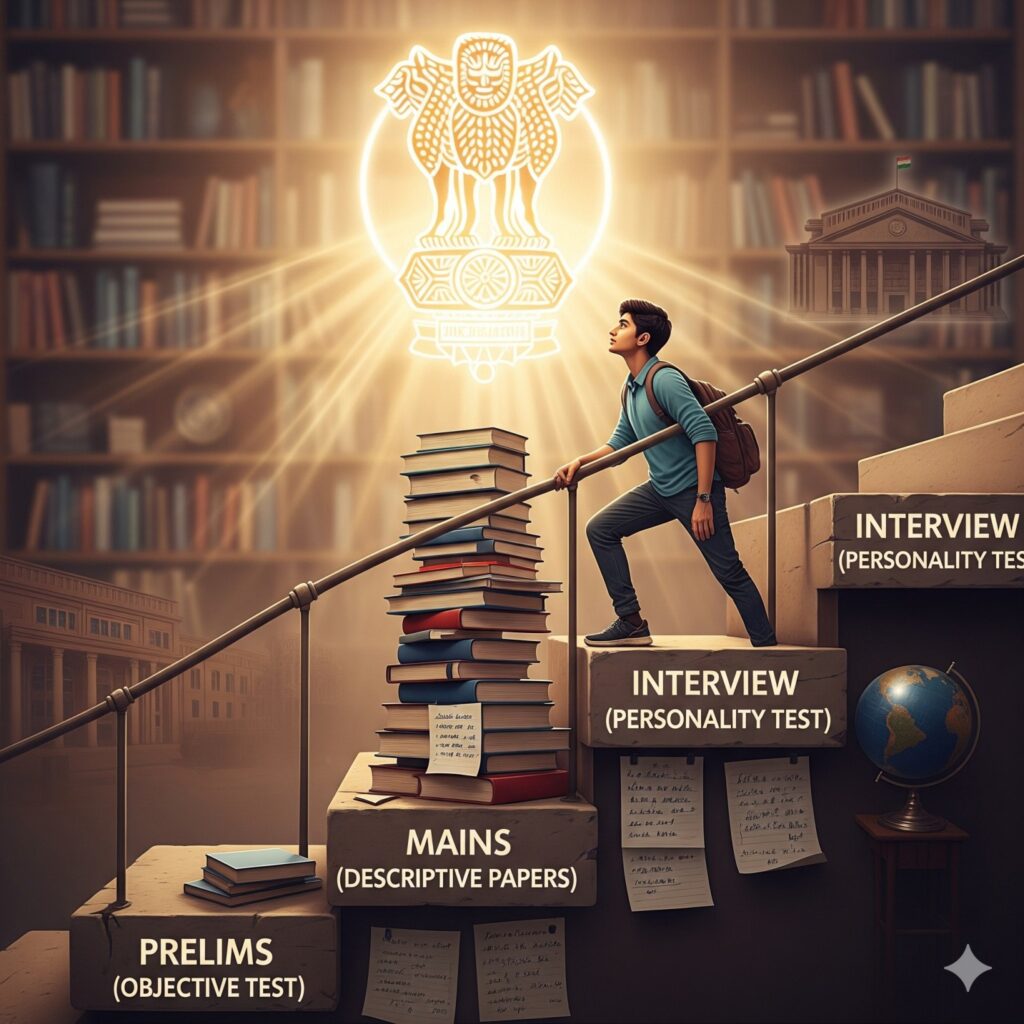
4. Long Preparation Journey
On average, an aspirant needs 1–2 years of preparation. This includes reading NCERTs, reference books, newspapers, and test series. Managing consistency for such a long time makes UPSC even harder.

5. Mental Pressure & Uncertainty
Even after years of preparation, selection is not guaranteed. Many aspirants clear Prelims but fail in Mains, while others reach the Interview stage and still don’t make the final list. Handling stress, pressure, and uncertainty is part of the UPSC journey.

📝 UPSC Exam Overview
The UPSC Civil Services Examination (CSE) is conducted in three stages. Every stage checks different skills of an aspirant — knowledge, writing ability, and personality.
UPSC Prelims
UPSC Mains
UPSC Interview
Final Merit List
📝 UPSC Eligibility Criteria
Before starting the preparation, every aspirant must check the UPSC eligibility criteria. Many students prepare for years but later realize they are not eligible due to age or attempt limits. Here is a clear breakdown:
1. Nationality Requirement
- For IAS, IPS, IFS → Candidate must be a citizen of India.
- For other services (like IRS, IAAS, etc.) → Candidates from Nepal, Bhutan, or Tibetan refugees settled in India before 1st January 1962 are also eligible.
👉 More details here: UPSC Nationality Rules.
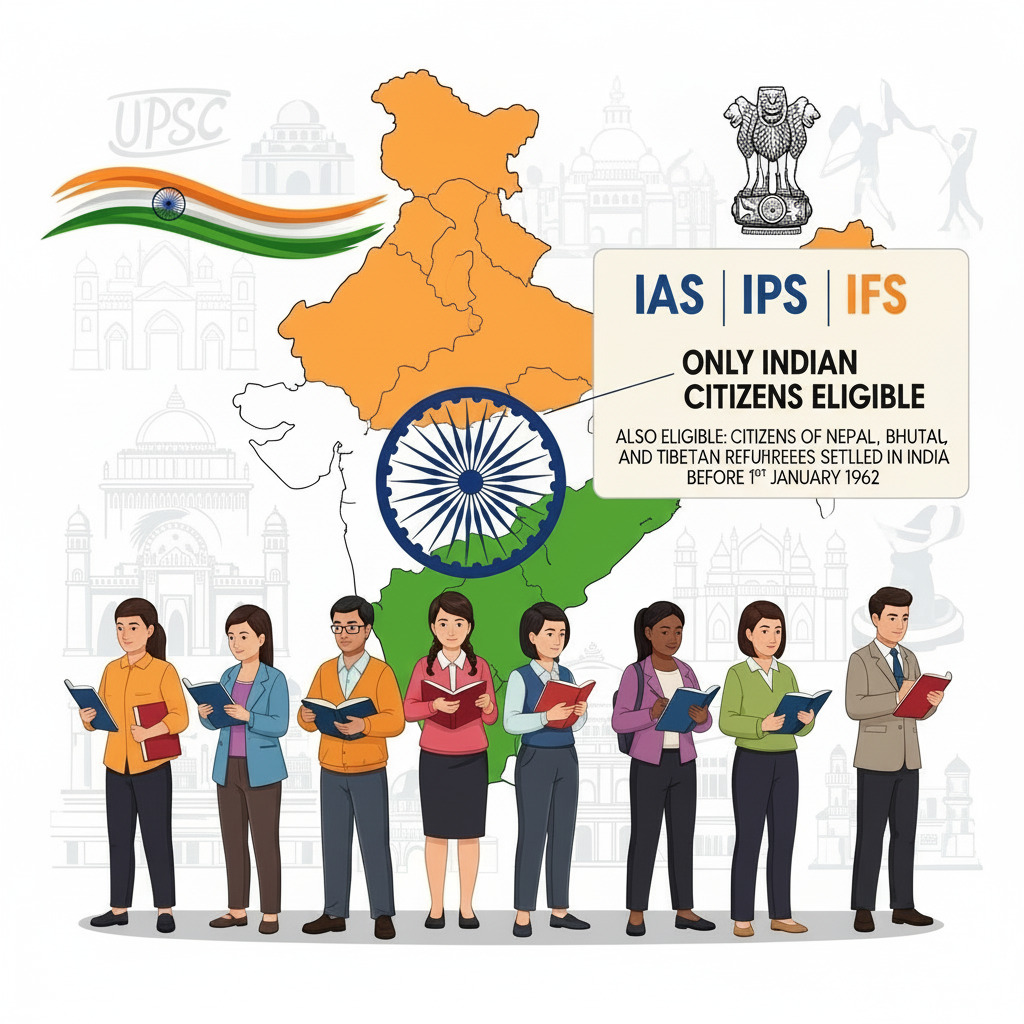
2. Educational Qualification
- Candidate must hold a graduate degree from a recognized university.
- Final-year students can also apply (but must show proof before Mains).
- There is no minimum percentage required.
👉 Check full list here: UPSC Educational Qualification Guide.

3. Age Limit for UPSC Exam
- Minimum age → 21 years.
- Maximum age → 32 years (General category).
- Age calculated as of 1st August of the exam year.
👉 Category-wise age relaxation:
- OBC: +3 years (max 35).
- SC/ST: +5 years (max 37).
- PwD (general): +10 years (max 42).
👉 Full details: UPSC Age Limit and Relaxation.
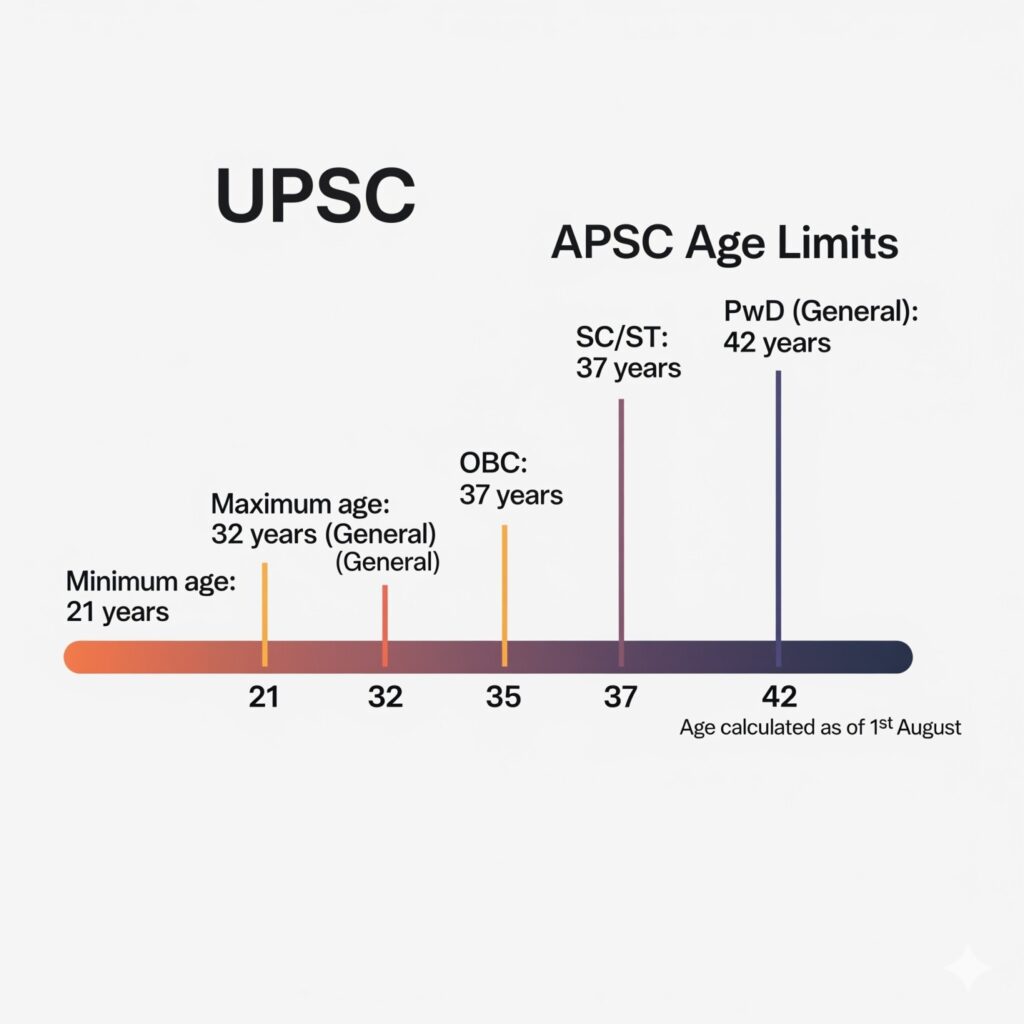
4. Number of Attempts Allowed
- General category: 6 attempts (till 32 years).
- OBC: 9 attempts (till 35 years).
- SC/ST: Unlimited attempts till age limit (37 years).
- PwD candidates: Depending on category.
👉 Know more here: UPSC Attempts Rules Explained.
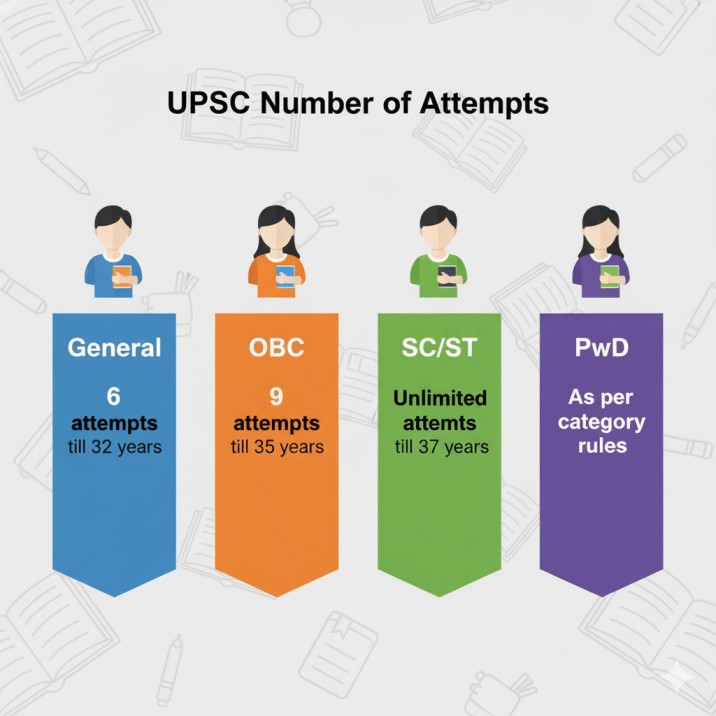
✅ Quick Note: Even if you appear for just one paper of Prelims, it will be counted as an attempt.
📝 UPSC Syllabus (Detailed Breakdown)
The UPSC Civil Services Syllabus is very wide, but if studied smartly, it becomes manageable. Knowing the syllabus clearly is the first step to preparing effectively.
1. UPSC Prelims Syllabus
The Prelims exam has two papers:
(a) General Studies Paper-I (Marks: 200)
- Current events of national & international importance.
- Indian History & Indian National Movement.
- Indian & World Geography (Physical, Social, Economic).
- Indian Polity & Governance (Constitution, Rights, Panchayati Raj).
- Economic & Social Development (Sustainable Development, Poverty, Inclusion).
- Environment & Ecology (Climate Change, Biodiversity).
- General Science.
(b) CSAT (General Studies Paper-II) (Marks: 200, Qualifying)
- Comprehension.
- Interpersonal skills & communication.
- Logical reasoning & analytical ability.
- Decision-making & problem-solving.
- Basic numeracy & data interpretation.
👉 Full details here: UPSC Prelims Syllabus in Detail.
2. UPSC Mains Syllabus
The Mains exam has 9 papers, all descriptive:
Qualifying Papers
- Paper A: Indian Language (Any regional language).
- Paper B: English Language.
Compulsory Papers (for merit ranking):
- Paper I: Essay.
- Paper II: General Studies I – Indian Heritage, History, Geography, Society.
- Paper III: General Studies II – Polity, Governance, International Relations.
- Paper IV: General Studies III – Economy, Science, Tech, Environment, Security.
- Paper V: General Studies IV – Ethics, Integrity, Aptitude.
- Paper VI & VII: Optional Subject (Any 1 subject with 2 papers).
👉 Detailed syllabus here: UPSC Mains Syllabus Explained.
3. UPSC Optional Subjects (List)
Candidates can choose one optional subject from subjects like:
- Public Administration
- Sociology
- Geography
- History
- Political Science
- Anthropology
- Literature (various languages)
Optional subjects play a big role in final marks.
👉 Check full list here: UPSC Optional Subjects List & Strategy.
4. Essay Paper in UPSC
- Candidates have to write two essays on given topics.
- Tests clarity of thought, language, and argument-building.
👉 Read: UPSC Essay Preparation Tips.
5. Importance of Current Affairs in UPSC
- Current Affairs is important for Prelims, Mains, and Interview.
- Sources: The Hindu, Indian Express, PIB, Yojana, Kurukshetra, RSTV debates.
👉 Resources guide: Best Current Affairs Sources for UPSC.
📝 UPSC Preparation Strategy (For Beginners & Advanced Aspirants)
The right UPSC preparation strategy can make a huge difference. Some aspirants are complete beginners, while others have already attempted the exam or studied before. Here we explain strategies for both.
UPSC Preparation for Beginners
If you are starting from zero, follow this step-by-step approach:
- Understand the UPSC exam pattern and syllabus.
- Start with NCERT books (Class 6–12) for History, Geography, Polity, Economy, Science.
- Read Laxmikant for Polity, Spectrum for Modern History, NCERT + GC Leong for Geography.
- Begin daily newspaper reading (The Hindu / Indian Express).
- Make notes for Current Affairs.
- Practice answer writing after 2–3 months of study.
- Solve UPSC previous year papers.
- Join a test series before Prelims and Mains.
👉 Best guide for beginners: How to Start UPSC Preparation from Zero.
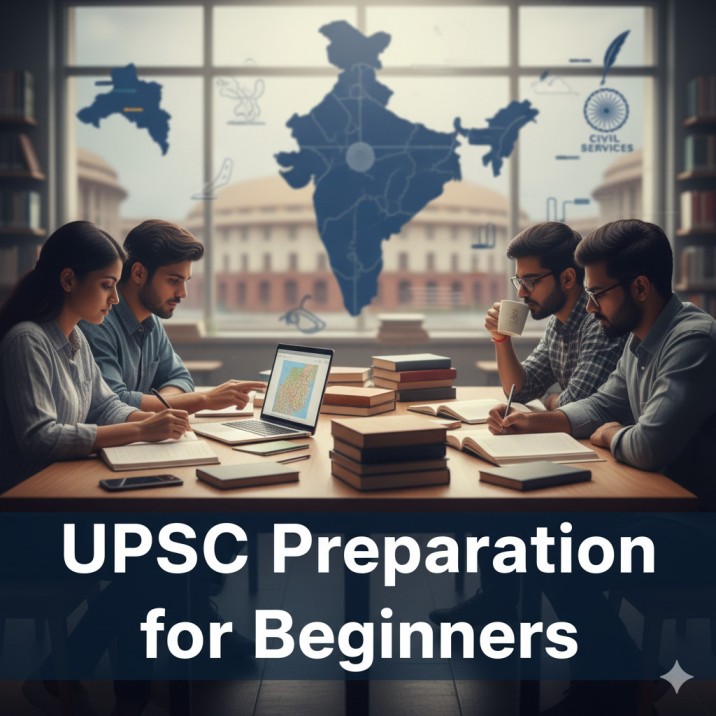
UPSC Preparation for Advanced Aspirants
If you already know the basics or have attempted before:
- Focus on optional subject mastery.
- Improve answer writing with test series.
- Revise NCERT + standard books multiple times.
- Focus more on current affairs + government reports.
- Practice time management for Prelims with mock tests.
👉 Advanced guide: UPSC Strategy for Repeat Aspirants.

1-Year UPSC Preparation Plan
For those who want to prepare in 12 months
Months 1–3:
- Complete NCERTs + Standard books
- Build strong basics
Months 4–6:
- Start answer writing practice
- Revise NCERTs + current affairs notes
- Select and start optional subject
Months 7–9:
- Join Prelims test series
- Continue answer writing for Mains
- Complete optional subject
Months 10–12:
- Focus on revision (NCERT + standard books + optional)
- Practice mock interviews
- Prepare short notes for last-minute revision
👉 Full guide:
1-Year UPSC Study Plan PDF2-Year UPSC Preparation Plan
For college students or early starters (24 months)
Year 1:
- 6–8 months: NCERTs + basic books
- 4 months: Start optional subject
- 2 months: Current affairs, answer writing basics
Year 2:
- 6 months: Prelims preparation + mock tests
- 4 months: Mains answer writing + essay practice
- 2 months: Final revision + interview preparation
👉 Detailed strategy:
2-Year UPSC Preparation Roadmap📝 Top Coaching in Delhi for UPSC
Delhi is often called the Mecca of UPSC preparation. Thousands of students move here every year because the city offers the best coaching institutes, study material, peer group, and mentorship.
Here are the main reasons why Delhi is the hub of UPSC coaching:
1. Presence of Top Coaching Institutes
Areas like Mukherjee Nagar, Rajinder Nagar, and Karol Bagh are filled with India’s most reputed IAS coaching centers. These institutes provide:
- Experienced faculty.
- Updated notes and study materials.
- Regular test series and answer writing sessions.
👉 Explore: Best UPSC Coaching in Delhi – Compare Here.
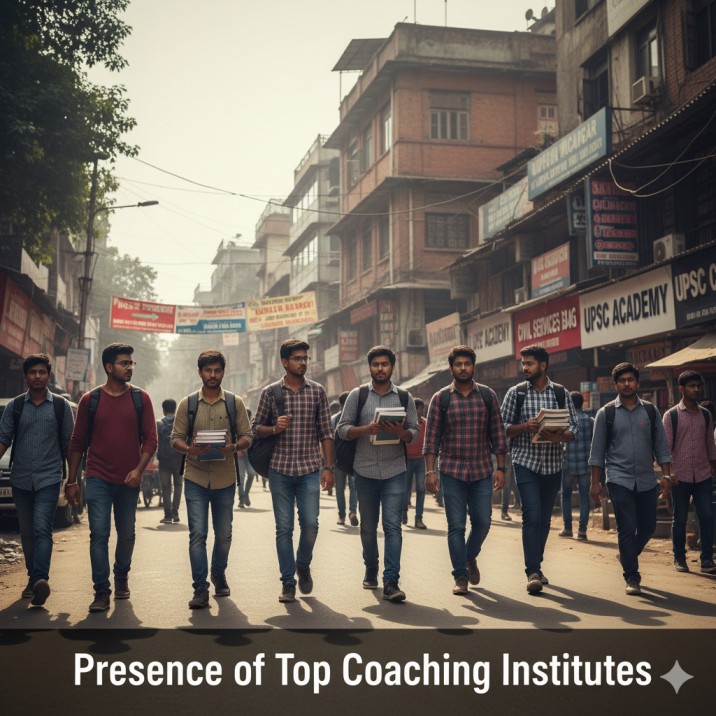
2. Access to Peer Learning and Study Groups
In Delhi, aspirants get a chance to interact with thousands of other students preparing for the same goal. This creates an environment of:
- Motivation.
- Healthy competition.
- Group discussions for Current Affairs.
👉 Read more: Benefits of Group Study in UPSC Preparation.

3. Updated Study Resources
Most Delhi coaching institutes provide their own monthly magazines, hand-written notes, and current affairs booklets. Many toppers rely on these materials in addition to standard books.
4. Mentorship and Guidance from Toppers
Many UPSC toppers who cleared the exam from Delhi often come back to guide new aspirants. This kind of mentorship is harder to find in smaller towns.
5. Library and Study Infrastructure
- 24×7 libraries.
- Affordable hostels and PGs near coaching hubs.
- Photocopy shops with ready-made notes for all subjects.
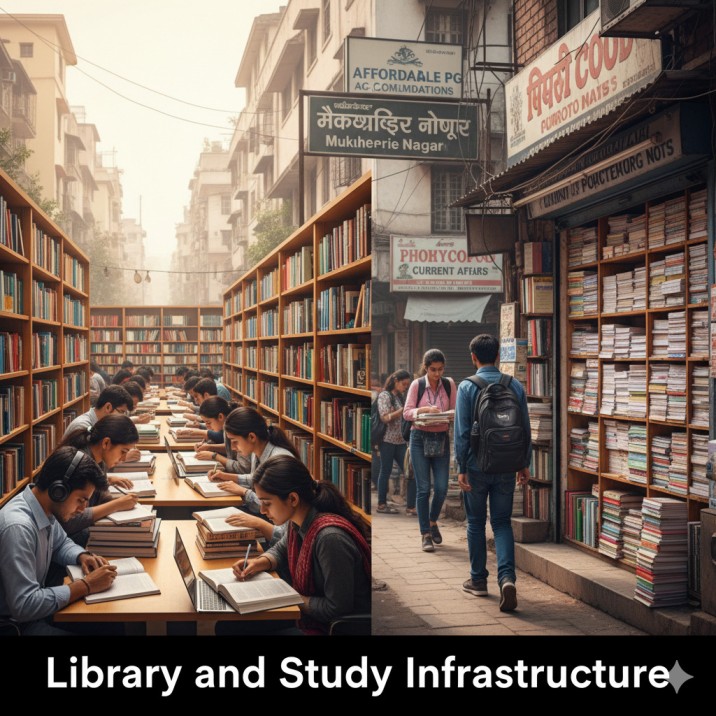
6. How TCD Helps Aspirants
Searching for the right coaching in Delhi can be confusing because there are hundreds of IAS institutes.
This is where Top Coaching in Delhi (TCD) comes in:
- Compare multiple coaching centers in one place.
- Check faculty details, fee structure, batch timings.
- Read student reviews.
- Directly connect with institutes.
👉 Start your search here: Find Best IAS Coaching in Delhi with TCD.
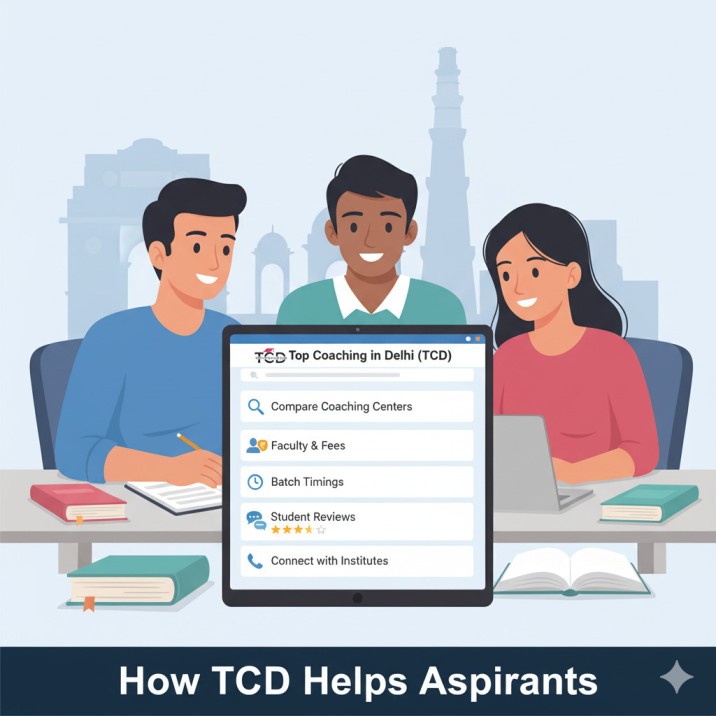
📝 Self-Study vs Coaching in UPSC Preparation
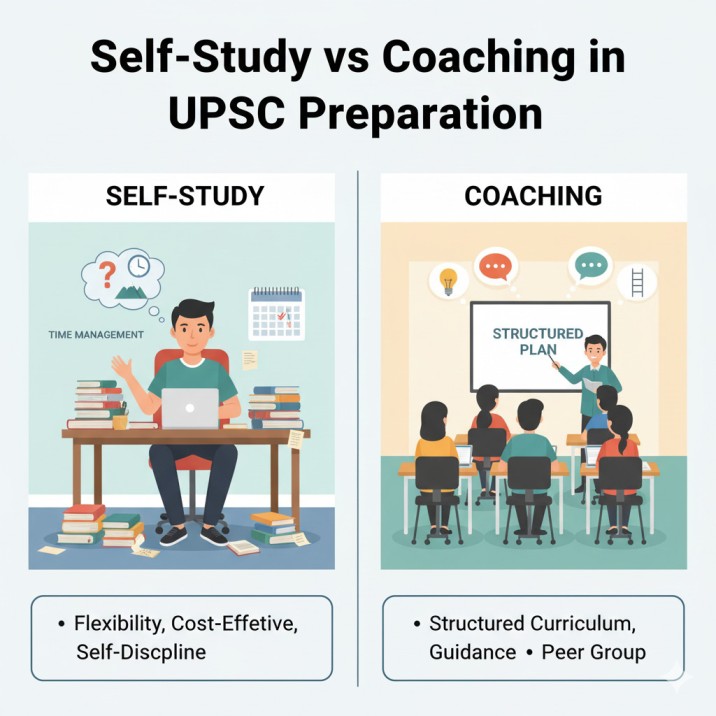
One of the biggest questions every aspirant faces is: “Should I join coaching for UPSC or prepare through self-study?” Both paths can lead to success, but the choice depends on individual needs. Let’s compare:
| 📋Factor | 📚Self-Study | 🏫Coaching in Delhi |
|---|---|---|
| 💰Cost | Very affordable, only book & internet cost. | Expensive (₹1–2.5 lakhs+ per year). |
| ⏰Flexibility | Full control over study hours, pace, and strategy. | Fixed schedule, less flexibility. |
| 🧭Guidance | No direct mentorship, only online guidance. | Experienced faculty, structured guidance. |
| 📖Resources | Dependent on books, YouTube, free materials. | Updated study notes, test series, current affairs magazines. |
| 💪Motivation | Can be lonely, requires strong discipline. | Peer learning & competitive environment. |
| ✍️Answer Writing Practice | Need to join online test series separately. | Regular tests + instant feedback from teachers. |
| ⚠️Chances of Mistakes | High risk of wrong strategy, wasting time. | Guidance reduces mistakes, saves time. |
Pros of Self-Study
- Low cost, affordable for everyone.
- Flexibility to design your own study plan.
- Freedom to focus more on weak areas.
👉 Guide here: How to Prepare for UPSC without Coaching.
Pros of Coaching in Delhi
- Structured preparation with proper timetable.
- Access to toppers’ mentorship.
- Updated study material and mock tests.
- Environment of competition pushes consistency.
👉 Explore: Best IAS Coaching in Delhi – Compare Here.
Ideal Strategy: Blend of Both
The best results come from combining self-study with coaching guidance.
- Use coaching for concept clarity, test series, mentorship.
- Use self-study for revisions, NCERTs, and optional subject mastery.
📝 Digital Resources for UPSC Preparation
In today’s time, UPSC preparation is not limited to books and classrooms. With the rise of online platforms, mobile apps, and YouTube channels, aspirants can access high-quality study material from anywhere.
Here are the best digital resources for UPSC preparation:
📱 Mobile Apps for UPSC
- • Vision IAS App – Test series, current affairs, and daily quizzes.
- • IAS Baba App – Prelims quiz, 60-day plan, value-added notes.
- • InsightsIAS App – Secure initiative for answer writing, daily current affairs.
- • ClearIAS App – Mock tests, notes, and study plans for beginners.
🌐 Websites for UPSC
- • PIB (Press Information Bureau) – Official government updates.
- • PRS India – Policy briefs, bills, and current laws.
- • RBI & Economic Survey – For Economy preparation.
- • Top Coaching in Delhi (TCD) – Compare best IAS coaching centers in Delhi.
🎥 YouTube Channels for UPSC
- • Drishti IAS – Hindi & English lectures, answer writing.
- • Unacademy UPSC – Free lectures by top educators.
- • StudyIQ Education – Current affairs and GS lectures.
- • Byjus IAS – Animated explanations for concepts.
📚 Free PDFs & E-books
- • NCERTs (Class 6–12) – Downloadable for free.
- • Yojana & Kurukshetra Magazines – Monthly issues for essays & GS.
- • Economic Survey & Budget Summary – Key for Prelims + Mains.
- • Previous Year Question Papers (PYQs) – Best self-evaluation tool.
📝 Tips from UPSC Toppers
Many aspirants feel lost while preparing, but learning from UPSC toppers can give clarity. Here are some powerful tips that helped toppers crack the Civil Services Exam:
🎯 Consistency is More Important than Intensity
Most toppers say that studying 6–8 hours every day for one year is better than studying 12 hours randomly.
"I never studied 14 hours a day. I just stayed consistent."
– UPSC Topper AIR 27
🧠 Smart Work Beats Only Hard Work
Covering the entire syllabus is impossible. Toppers focus on important topics from PYQs and current affairs instead of reading everything.
"Don't run behind 10 sources. Revise 1 book 10 times."
– UPSC Topper AIR 63
✍️ Answer Writing is the Key for Mains
Even if you know the answer, presentation and structure decide your marks. Practice daily answer writing.
"I improved my marks by 50+ just by working on answer structure."
– UPSC Topper AIR 92
⏰ Time Management for Prelims
Prelims is all about accuracy. Toppers suggest practicing mock tests to avoid silly mistakes.
"Mock tests gave me confidence and helped me manage time in Prelims."
– UPSC Topper AIR 11
💚 Mental Health & Balance Matters
Many toppers faced failures before clearing. They emphasize stress management, breaks, and hobbies to stay motivated.
"It took me 3 attempts. Staying positive was harder than reading books."
– UPSC Topper AIR 126
📝 Conclusion
The UPSC Civil Services Examination is not just an exam, it’s a life-changing journey. With the right strategy, consistency, and guidance, even an average student can crack it.
Delhi has become the hub of UPSC coaching, but finding the right institute is often confusing. This is where Top Coaching in Delhi (TCD) helps aspirants by giving them a comparison platform to choose the best coaching, check reviews, and connect directly.
👉 If you are serious about becoming an IAS officer and want the right support, start your journey today with TCD
Compare Best UPSC Coaching in Delhi with TCD.
Stay consistent, stay motivated — your UPSC dream is waiting for you. 🚀
❓ FAQs on UPSC Exam
Yes. UPSC is considered tougher because of its vast syllabus and low success rate (less than 0.2%).
Absolutely! With consistent preparation, right strategy, and smart work, even an average student can become an IAS officer.
General: 6 attempts
OBC: 9 attempts
SC/ST: Unlimited till age 37
Start with NCERTs, standard books, daily newspaper reading, and join a test series after 4–5 months.


